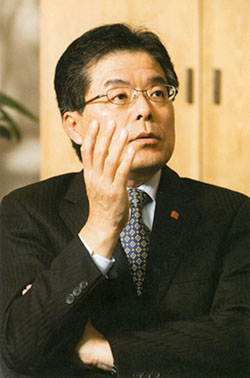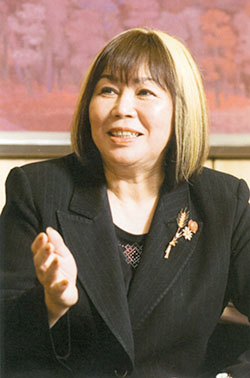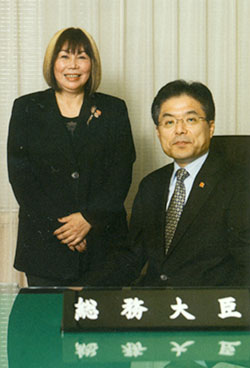
Talk interview of 'New Media' 25th anniversary
A Transformation from 'Almost' to 'All'
-Close-Captioned TV can be a Business Opportunity-

Hiroya Masuda, Minister of International Affairs and Communications
Minister of State for the Decentralization Reform, Regional Revitalization, Regional Government (doshu-sei), and Privatization of the Postal Services
"Focusing on the 'C' in Information Communication Technology(ICT) is Critical."
Profile
Hiroya Masuda
Minister of International Affairs and Communications
Minister of State for the Decentralization Reform, Regional Revitalization, Regional Government (doshu-sei), and Privatization of the Postal Services
Born in Tokyo (1951)
Graduate of Department of Law at The University of Tokyo (March, 1977)
Joined the Ministry of Construction (April, 1977)
Director, Traffic Enforcement Division, Traffic Department, Chiba Prefectural Police Headquarters (March, 1982)
Director, Railway Traffic Division, Department of Planning, Ibaraki Prefectural Government (April, 1986)
Director of River Administration Policy Planning, General Affairs Division, River Bureau, Ministry of Construction (July, 1993)
Director of the Construction Disputes Settlement, Construction Industry Division, Economic Affairs Bureau, Ministry of Construction (July, 1994)
Governor of Iwate Prefecture (April, 1995-April, 2007)
Member of the Postal Privatization Committee (April, 2006)
Member of the Supervisory Commission for Public-Private and Private-Private Competitive Tenderings (July, 2006)
Deputy Chair, Decentralization Reform Committee (April, 2007)
Minister of Internal Affairs and Communications (August, 2007)

Nami Takenaka, Member of the Information and Communications Council (Ministry of Internal Affairs and Communications)
"Closed-Caption on Terrestrial Digital Media Broadcasting (T-DMB) Needs to be Seen as a Business opportunity rather than a part of a Social Welfare Program."
Profile
Nami Takenaka (Nami-ne), the Chairperson of Prop Starion, Social Welfare Organization
Born in Kobe in 1948
After giving birth 34 years ago to a baby girl born with severe disabilities, she is self taught in the knowledge of medical care, welfare, and the education for children with disabilities.
Formed Prop Station as a grass-root group in 1991
Acceded to Chairperson after Prop Station obtained its corporate status as a social welfare organization approved by the Minister of Health and Welfare in 1998
Nami has been promoting independence and social participation of the challenged, and has been especially engaged in improving their employment situation with the help of Information Communication Technology (ICT). She has been presiding over the Challenged Japan Forum International Conference since 1995 under the slogan 'the Challenged can become taxpayers!'
Appointments
Member of Fiscal System Council (Ministry of Finance)
Member of Information and Communications Council (Ministry of Internal Affairs and Communications)
Member of Central Council for the Promotion of Measures for Disabled Persons (Cabinet Office)
Supervisor of the Autonomous Movement Support Project (Ministry of Land, Infrastructure, and Transport)
Books
Let's Be Proud! (Japan Times)
lucky woman –Mainasu koso Purasu no Tane (Asuka Shinsha)
Hiroya Masuda, appointed as Minister of Internal Affairs and Communications for his experience in local administration, has strong expectations from exhausted local regions. Nami Takenaka, Chairperson of Prop Station, visited Minster Masuda's office to discuss the issues on the utilization of Information Communication Technology (ICT) in local regions, and on the dissemination of Terrestrial Digital Media Broadcasting (T-DMB).
Growing Concerns of Genkai Shuraku Issues
Genkai Shuraku -a community that has reached a critical limit in the number of elderly that ultimately hinders their ability to function properly
Nami Takenaka: Congratulations on being inaugurated as Minister of internal affairs and communications. Minister Masuda, who played an active part as Iwate Governor, is now in charge of a significant role in revitalizing our country and local regions. What has changed in terms of your responsibilities and actions since you have become Minister?
Minister Masuda: The Somusho (Ministry of Internal Affairs and Communications) assumes key roles in the administrative control, local administration, and information-communication administration. As a governor, I have been undertaking all areas such as education or social welfare, but as a Minister I devote myself to each related issue piece by piece.
As a Minister, I try to visit local region as much as possible and talk with the people to hear their real opinions. During my term as Iwate Governor, I tended to think that I wanted the national government to know the sober reality of local regions more. So now I would like to act upon that idea in my capacity as a Minister.
Nami: I started Prop Station and have been actively engaged in striving for a society where the Challenged (people with disabilities), described as the disadvantaged sometimes, can benefit from and utilize Information Communication Technology (ICT) to become important members of our society and support the foundation of our society as taxpayers.
Minister Masuda: In the issue of the Genkai Shuraku, the communities that have reached a critical limit in the number of elderly that ultimately hinders their ability to function properly, I have the impression that people in those remote areas can benefit more from the utilization of ICT to optimize their quality of life.
ICT -For Heartful Communications, not just a Business Tool
Minister Masuda: Japanese business activity so far has been pursuing the economy of agglomeration, which has resulted in the concentrated convenience of the urban population. Now that the community structure has been changing into an aging society with a falling birthrate however, it is becoming difficult to maintain the economy on the conventional policy alone. Our country today is facing a serious time to innovate our methods, willingly or unwillingly, which could lead to a positive utilization of ICT I believe.
Nami: I agree. You can choose commercial products you want for instance, and obtain them at home through an online shopping system. You neither have to make a long trip nor carry heavy stuff to your home. It will not only be a service appreciated by the elderly, but can also be a tool used to connect those living in a 'dotted population'.
Minister Masuda: Apparently, the ICT tools have been bringing this remarkable convenience while the severe phenomenon exists. Now all we have to do is devise the means of the technology.
Nami: In addition, it would appear that the aging population of the future has a higher knowledge of application skills in ICT, as many of them would have some kind of experience in using those technologies during their life.
Minister Masuda: I can imagine that it would be hard for elderly people in Japan now to achieve mastery of ICT, because many of them wouldn't have used it before. As Ms. Takenaka said, the circumstances surrounding ICT would be different in the next 10 or 20 years due to the increase of the elderly population with ICT experience.
Nami: The number of senior volunteer staff members with ICT skills is increasing at Prop Station. I believe that behind the trend is the fact that the use of ICT is becoming an interest among people in their sixties and seventies. It is important that the delivering system of ICT be devised for those people's convenience, instead of assuming that they can not use ICT because of their age and geographic disadvantages. In doing so, we can inject vitality to them.
The 'C' of ICT is 'Communication'. It is a tool to connect people. Then in Kanji, information (Jo-ho) consists of two characters; 'compassion (Jo)' and 'inform (Ho)'. Thus, ICT is a tool to inform our compassion as well as a useful tool for business. I wish Japan will be a country with a good sense this 'compassion'.
Minister Masuda: It is important that ICT is considered not only as a business tool but also as an agency getting to people's heart. As you said, I have no doubt that working out the policy focusing on the 'C' of ICT is critical.
Nami: We presided over 'the Challenged Japan Forum' in Iwate with the help of Minister Masuda at a time when you were Iwate prefectural governor. The concept of this forum is influenced by the idea of the US that 'the success of people with the severest disabilities can be lead by the best technology'.
There is a significant difference in the way of approaching ICT between the U.S. and Japan. In the U.S., the fundamental idea of ICT is 'for all'. It is required that all information and documentation online be accessible to its users. By doing this, the opportunities of having a college education are wide open for not only people with disabilities, but also for working people in remote areas. In Japan however, we have the mind-set of approaching this issue as 'for people with disabilities'. This mentality limit's the issue only to a standpoint of social welfare.
Minister Masuda: The idea is as key as the principles of structures themselves.
Closed-Caption –The Change of the Viewpoint from Social Welfare to Business Opportunities
Nami: You have remarked on closed-caption of the terrestrial digital media broadcasting (T-DMB) at Information and Communications Council. Have you seen any producing sites of closed-caption?
Minister Masuda: I have seen the system that produces closed-captioning when I visited NHK Science & Technical Research Laboratories. It looked like an enormous job to broadcast with closed-caption real time because it needs special devices such as phonetic recognition systems. Ms. Takenaka, have you ever visited those sites too?
Nami: I have visited those sites at NHK, private TVs, and other production companies. It is innovative that the caption is displayed on TV by just turning it on with a T-DMB receiver.
Minister Masuda: I have studied T-DMB during my term of Iwate Governor. One of its concepts is 'people-friendly broadcast'. In other words, the T-DMB has been evolving to the point that all T-DMB receivers are now compatible with closed-caption.
Nami: I look to this service. In the U.S., closed-caption is used in such settings as sports bars where people can't hear the sound in the roar of the crowd. It is also utilized in places where people are supposed to keep quiet such as the waiting room of a hospital. Today in Japan, we find people watching one-segment broadcasting on the train without making noise. These are the examples of how closed caption helps in our daily lives.
Minister Masuda: The TV caption used to be a service just for people with hearing impairment at the time of analog broadcasting. It is a significant change that now all people can utilize the system for any purpose as a 'people-friendly broadcast'.
Nami: We still have an issue however, that closed-caption is not available for commercials. With commercials consisting of 20% of the broadcast day, I find it unreasonable for such a structure to be arrangement within the industry. It is a large loss for businesses that a big chunk of people can not get access to the up-to-date information of their products through commercials. I have an impression that commercial television underestimates the commercial interests of closed-captions with the firm commitment to a welfare standpoint in which closed-caption has to be for people with a hearing impairment.
Minister Masuda: Looking at closed-captioning as a business opportunity is important. In other words, expanding the service as a commercial activity makes it possible to see expenses on investments and results in a long-lasting success of their service.
Nami: To make it happen, systemic reforms are also necessary. The word 'public' means 'almost' in Japan as opposed to 'all' like in the U.S.. Such differences turn out to be the discrepancy in vitality between Japan and the U.S.. 'Closed-caption' also provides business opportunities as the Minister Masuda said. Those business chances can arise only when we think of the service as a convenience for all, not just as policies for disadvantaged people.
Minister Masuda: 'Making all documentation online accessible to its users' is totally different from 'trying to make as much as possible'. It is critical that we look at ICT as a fundamental structure of society for all. For the complete transition of broadcasting systems to T-DMB in July of 2007, we must work on those issues based on the idea of 'for all'.
Somusho is a government working on reforms of social norm. All the more reason to be careful, but we also need to make an active movement to better society. As for companies, it is important to conduct their businesses under the consistent rules of our society. Japan is a country with cutting edge technology but we tend to 'own' it. I strongly hope that our technologies can be spread out beyond the sea rather than stay within the country.
As you said information is 'to inform' our 'compassion' in Japan, I believe the concept is universally common. It is great if information can be passed around through the use of Japanese technologies. Now we may need to cooperate with other countries in a different way than when Japanese company soldiers were active abroad 30 or 40 years ago.
Nami: The negative issues we discussed are due to the lack of resourcefulness for people who use it I believe. Minister Masuda, it is tremendous task, but I am in great hopes of your active role. Thank you for making time in your busy schedule today.

This is a translation of an article that originally appeard in the January issue of the magazine, 'Monthly NEW MEDIA'.
|




